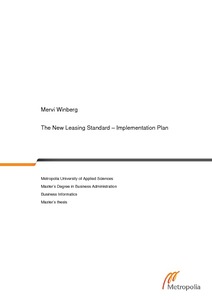The New Leasing Standard - Implementation Plan
Winberg, Mervi (2015)
Winberg, Mervi
Metropolia Ammattikorkeakoulu
2015
Julkaisun pysyvä osoite on
https://urn.fi/URN:NBN:fi:amk-2015092514884
https://urn.fi/URN:NBN:fi:amk-2015092514884
Tiivistelmä
In the future, the new IFRS (International Financial Reporting Standard) leasing standard requires corporations to record the majority of the current operating leasing contracts in the Statement of Financial Position. The present thesis was a case study that wanted to analyse what this new standard requirement meant for the target company. More precisely, the aim of the work was to evaluate what kind of platform should be used for monitoring lease agreements in the future and how the company should prepare itself for lease accounting changes.
The theoretical framework of the study focused on the IFRS leases, the selection criteria and decision making processes in an organization. The study was conducted as a case study using qualitative research methods. In this thesis, qualitative and quantitative information was collected, people were interviewed regarding the leasing issues, topical leasing seminars were participated in and a literature-review was conducted.
The main results of the thesis were the following conclusions: for the lessee the new leasing standard will increase administrative burden, it is important to coordinate the implementation project steps with the corporate IT department and based on current available platforms. The technical solution suggested was an Excel tool. The platforms to calculate the future cash flows and accounting entries can be Excel solutions developed in-house or an Excel tool to be purchased from an external vendor. The target company has enough time to tailor the tool to their needs. When the new standard will be published, the target company needs to consider a precise timetable for the implementation project. Entries in the general ledger accounts should be walked through with the auditors. The training should focus on the user needs and it should be as practical as possible. During implementation a support plan for the system should be created as well and either a formal or informal post-implementation review will be made.
The theoretical framework of the study focused on the IFRS leases, the selection criteria and decision making processes in an organization. The study was conducted as a case study using qualitative research methods. In this thesis, qualitative and quantitative information was collected, people were interviewed regarding the leasing issues, topical leasing seminars were participated in and a literature-review was conducted.
The main results of the thesis were the following conclusions: for the lessee the new leasing standard will increase administrative burden, it is important to coordinate the implementation project steps with the corporate IT department and based on current available platforms. The technical solution suggested was an Excel tool. The platforms to calculate the future cash flows and accounting entries can be Excel solutions developed in-house or an Excel tool to be purchased from an external vendor. The target company has enough time to tailor the tool to their needs. When the new standard will be published, the target company needs to consider a precise timetable for the implementation project. Entries in the general ledger accounts should be walked through with the auditors. The training should focus on the user needs and it should be as practical as possible. During implementation a support plan for the system should be created as well and either a formal or informal post-implementation review will be made.
